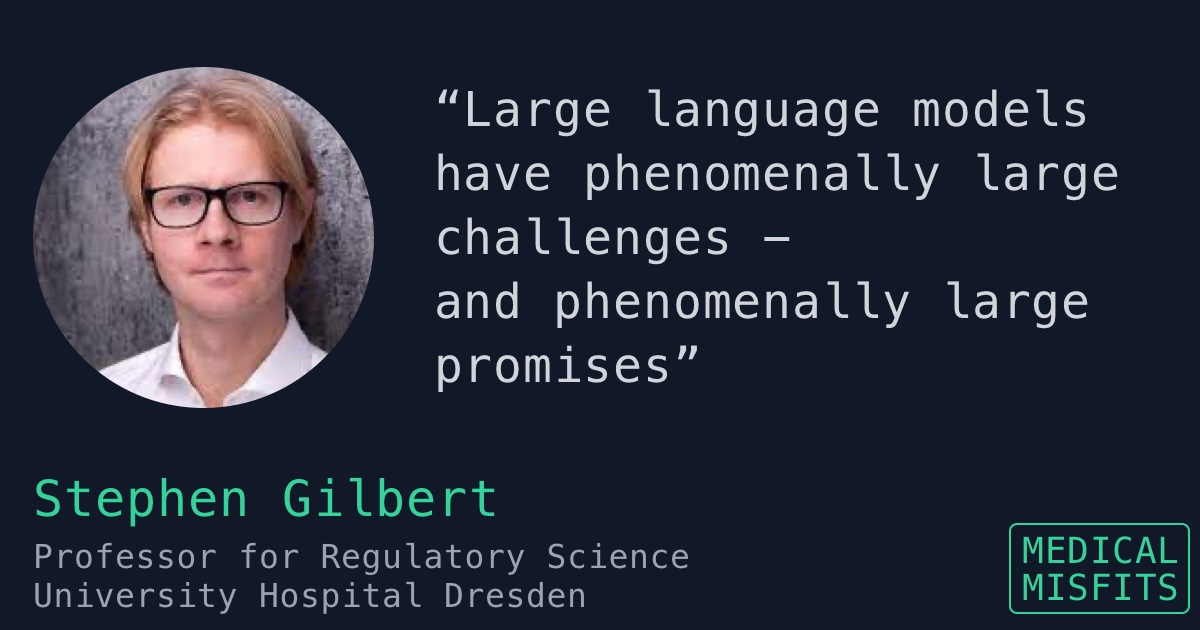I feel like that, with each guest I describe here, I always start off with “man, this person was really interesting and we had so much to talk about”. So I don’t want to sound repetitive or so, but man, Stephen Gilbert really was quite interesting and we had so much to talk about - so much that we ended up going over our scheduled time of one hour.
There’s so much to unpack here. First off, we talked about Stephen graduating as a veterinarian (to those non-native English speakers: that’s a doctor who treats animals) and how he started working on the food and mouth disease outbreak in the UK. That already could probably fill a podcast! We did however manage to move on and talked about him transitioning first into research and then into working at a medical device manufacturer, Biotronik, in Berlin. After that, he worked at Ada (like a few other guests on this podcast). Now, he’s a professor for regulatory science at the University Hospital in Dresden.
What the hell is regulatory science? Glad you ask, because that’s one of many things we talk about on the podcast. But that’s not it - we also went further into the topic of “ChatGPT” and other large language models in Healthcare, the promises they offer and the (regulatory) problems we might encounter when bringing them to patients.
So, you see, we covered a lot. Listen to this episode to hear it for yourself!
Stephen’s Biography
Stephen Gilbert is a veterinarian and professor for regulatory science at the University Hospital Dresden. Before that, he worked as a regulatory affairs manager specializing in clinical evaluation at Biotronik in Berlin, a large and established medical device manufacturer, and then for at Ada Health, also in Berlin, as director of clinical studies and clinical evaluation. Initially, after graduating as a veterinarian in 2001, he worked as a veterinarian and veterinary surgeon for around 10 years in the UK. In addition to studying veterinary sciences a the University of Glasgow, he did a Master’s Degree in Biomathematics, Bioinformatics and Computational Biology at the University of Leeds, and followed that up with a PhD in computational biology.
Things we talked about
- Why he stopped working as a vet: “List-based” work vs. “project-based” work
- Learning self-sufficiency as a vet while having to perform all sorts of operations after graduating
- How he was involved in handling the food and mouth disease outbreak and how that relates to project management
- Transitioning into “wet lab” scientific research and simulations
- How he joined Biotronik, a medical device manufacturer based in Berlin, and worked there to acquire the first-ever CE certificate for a medical device under the new Medical Device Regulation
- The benefits of doing a Master’s degree and/or PhD as a doctor and which sort of program / research area to look for
- We both talked about the German system of doing a “Dr. med” research degree
- What does a Professor of Regulatory Science do? And what is Regulatory Affairs?
- The “implant files” which led to the uncovering of implants which caused harm in patients and their effect on subsequent medical device regulation
- Are we over-regulating medical devices? Do we even have any data to answer that question?
- AI in Healthcare: Chances and risks of ChatGPT and large language models (LLMs)
- LLM medical software currently on the market, their features and considerations whether they are medical devices
Listen to the Episode
Links As Mentioned In The Podcast
- Stephen on LinkedIn.
- A paper published by Stephen on regulatory considerations for AI models.


